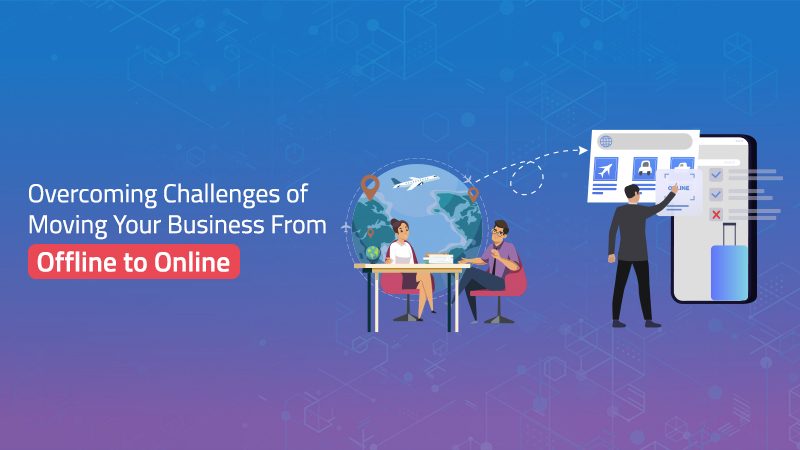‘Luxes Travels is a travel company with over 10 years of experience in the travel industry. They had some success and decided to move their business online to explore bigger avenues. They created a travel portal hoping to increase productivity and profits. But the transition was uneventful, with employees, agents and customers unprepared for the sudden move, and there was confusion, mistakes and worry. “
Sound familiar? Many travel companies have gone through the awkward stage of transitioning from offline to online. Moving your business online can be very beneficial to your business. It makes running a business easier, faster and more profitable, and it opens up new avenues. A major challenge for individuals and organizations is moving from offline to online environments. These challenges can become obstacles if not handled well.
As a travel company, when you move from offline to online, you not only experience a complete shift in priorities, but also in the way you do business. The challenges you’ll face can become obstacles if you don’t have a plan to solve them. We’ve listed potential problems you may encounter and how to deal with them.
Here are some ways to overcome these challenges:
Challenges of online migration
Concerns about digital complications
Most people are wary of change. Digitization also brings its own set of challenges. People worry about adapting to new technology. They are either worried about not being able to use the technology correctly or about being replaced by it. It’s important to understand what these concerns are.
- Agents may not always use the platform.
- They may face problems while using the portal.
- Customers may feel there is a lack of personal touch.
cost
Most people are concerned that any changes to the way business is conducted will impact costs. For your agent, it might be their commission, for your client, it might be additional expenses due to the shift. Make sure your customers know they won’t lose any money during this transition.
- Inform your customers of your pricing policy.
- Your agents should understand the opportunities available to them through online business transfer. For example, apply tags.
OTRAMS allows you to calculate and add your mark Introduction, increase profits and more.
training time
Agents may not feel comfortable with the time required to dedicate to training. This won’t be time-consuming if your technology partner provides you with training and support.
- Choose a technology provider that provides training and support for you and your team.
- Use digital tools for training.
- There are rewards for training periods.
change management
Change management is described as the processes and steps a company adopts when implementing changes that are integral to its internal and external processes. This includes educating and training employees, establishing change processes, and tracking actions before and after the change to ensure success.
Set online booking goals
Your team is used to booking offline, so transitioning to online booking may not be easy. Offline bookings are unlikely to stop suddenly. Therefore, our goal is to reduce the number of offline bookings and increase online bookings.
- Give them time to adapt to new features.
- Slowly make it easy for them to book online.
- Set a target or time limit after which offline bookings will no longer be accepted – for example, within 2 months, your agency must have 30% of online bookings, and within four months, this number should Double that to 60%.
behavior change
You must encourage your agents and clients to use online booking tools. Your agents and customers must become more comfortable with booking online. They need to learn how to operate these tools and understand the various features so that your organization can benefit from the use of digital tools.
- Provide them with adequate study materials.
- Set a schedule for study time.
- Encourage the use of online tools in all aspects of your business.
track
The goals you set for your company need a tracker, and you need to set milestones. Your milestones are a good indication of where your business is on its digital journey.
- Set reasonable milestones for your team.
- Look back at how many milestones you have achieved.
- Evaluate the changes you need to implement to make the transition easier.
solve challenges
Solving any challenges you face when moving from offline to online depends on your ability to communicate intelligently and allay fears that agents, stakeholders and customers may have.
Educate stakeholders, agents, customers
Your team is already trained on every aspect of your business; however, you must retrain them to use online tools. It takes them a lot of time to unlearn a lot of things, and just as much or more time to train on how to get the most out of digital ways of doing business.
- Conduct multiple training sessions for your stakeholders, agents and customers.
- Incentivize your agents to book online.
- When your customers book online, offer them exciting incentives, such as 20% off their first online booking.
communicate effectively
You need to communicate with your partners, customers, and agents to understand any changes they may encounter during the transition from offline to online.
- Inform your customers, partners, suppliers, etc. of your online actions.
- Provide tutorials, blogs, and other media they can use to become familiar with the technology.
- Keep open lines of communication to ease their fears about transitioning online.
exist digital ageas a travel company, your growth and success depends on your business goals and technology. With OTRAMS, your business can reach its full potential.
We offer dedicated customer support with 24/7 support for all customers by a dedicated Key Account Manager. OTRAMS also has an integrated CMS for customer communication and transcends language barriers by providing multilingual support.
Let the world lead Travel technology provider Help your business users enter a new era of productivity and profit, while helping you smoothly transition from offline to online business models.
We use cookies!
.
management consent
Privacy Overview
This website uses cookies to improve your experience while browsing the website. Out of these, the cookies that are categorized as necessary are stored on your browser as they are essential for the working of basic functionalities of the website. We also use third-party cookies to help us analyze and understand how you use this website. These cookies will be stored in your browser only with your consent. You can also opt out of these cookies. But opting out of some of these cookies may affect your browsing experience.
Necessary cookies are absolutely necessary for the website to function properly. These cookies anonymously ensure the basic functionalities and security features of the website.
| cookie | period | describe |
|---|---|---|
| cookielawinfo-checkbox-analysis | 11 months | This cookie is set by the GDPR Cookie Consent plugin. This cookie is used to store the user’s consent to cookies in the “Analytics” category. |
| cookielawinfo-checkbox functionality | 11 months | This cookie is set by the GDPR cookie consent to record the user’s consent to cookies in the “Functionality” category. |
| cookielawinfo-checkbox-required | 11 months | This cookie is set by the GDPR Cookie Consent plugin. Cookies are used to store user consent for cookies in the “necessary” category. |
| cookielawinfo-checkbox-other | 11 months | This cookie is set by the GDPR Cookie Consent plugin. This cookie is used to store the user’s consent for cookies in the “Other” category. |
| cookielawinfo – checkbox performance | 11 months | This cookie is set by the GDPR Cookie Consent plugin. This cookie is used to store user consent to cookies in the “Performance” category. |
| View the _cookie_ policy | 11 months | This cookie is set by the GDPR Cookie Consent plugin and is used to store whether the user agrees to the use of cookies. It does not store any personal data. |
Functional cookies help perform certain functions such as sharing website content on social media platforms, collecting feedback and other third-party functions.
Performance cookies are used to understand and analyze key performance indicators of the website and help provide visitors with a better user experience.
Analytical cookies are used to understand how visitors interact with the website. These cookies help provide information on metrics such as visitor numbers, bounce rates, traffic sources, and more.
Advertising cookies are used to provide relevant advertising and marketing to our visitors. These cookies track visitors on the website and collect information to provide customized advertising.
Other unclassified cookies are those that are being analyzed and have not yet been classified.








